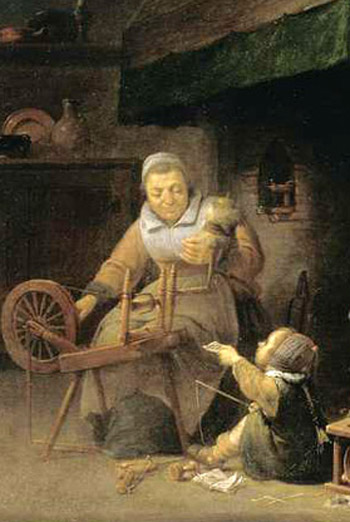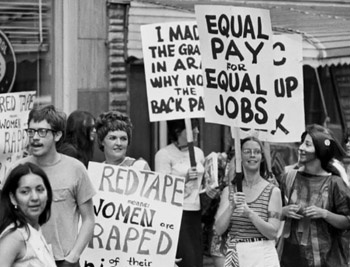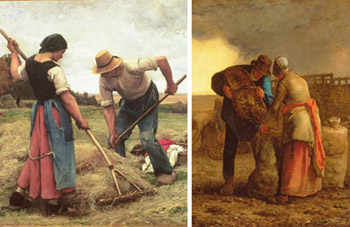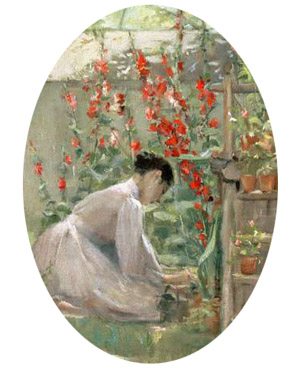Women and Men in Society
 |
 |
 |
 |
 |
 |
 |
Balancing Work: Men & Women in the Home
I recently received these interesting questions from a reader:
Dear Dr. Horvat,
I wish you a blessed Epiphany season! I have a few questions pertaining to what masculinity is and what the role of a father versus that of a mother is. I have read most of the articles on your website and your books on courtesy and family life, so I have a decent understanding as to what masculinity and femininity is.
But I am still a little confused as to what, practically speaking, a man should do that is different from a woman. For example, should a woman ever have to mow the land or do heavy work in the barn? I have been told that saving the hard outside work for the man (husband/father) is lazy on the part of the woman, because the man has to work all day and then come home only finding more work for him.
Additionally, I see so many families where the mother and father share the responsibility of taking care of the children. I mean, by both parents changing diapers, holding the crying baby, and so on. This seems to me to be very egalitarian, but the objections that are raised confuse me. After posting something on Facebook about the need for men to be masculine, I was answered with this reply:
"I think making the roles of father and mother exclusive (that is, what the mother does the father doesn't normally do and vice versa) is rather narrow. Traditionally feminine qualities include, like this article says, service and providing order and a home in the midst of chaos. Other qualities include generosity, modesty, beauty, and sensitivity. Traditionally masculine qualities include strength, leadership, courage, and honor.
"These qualities are not exclusive to each sex. A well-rounded human being, whether male or female, will have both masculine and feminine qualities. Listing masculine qualities is not intended to limit a man as a father to exhibiting only those qualities. Masculinity is bigger than the sum of its common, easily visible qualities. One perspective sums up the man's role as that of protector. Another quality is service. Christ, the pinnacle of masculinity, washed his disciples' feet.
"What is the role of a masculine father? Like you said, he's the head and authority of the family. He is to love his wife as Christ loves the Church - that is, to lay down his life for her. He also looks to Christ as a model headship - his headship of the household would mirror the headship of Christ to the Church. If you add to this the duty of the primary protector of the family, you get a role that is distinctly for the father, and one that can include activities such as holding his children and changing diapers. These activities are not an exception to the normal order of the family, but rather a way of living out his vocation as a father, which happens to look very similar to the mom's way of living out her role as a feminine mother.
"A man is the head of his household through loving his wife and serving his house, which oftentimes includes things like holding babies. Holding babies is not a side job to his masculine role, it is how the man lives out his role as father."
Please do help me to reply to this. Her response sounds wrong, but I am unable to think of an adequate response. I myself am confused about what a father is to be. Should he play with his children? How does he raise his children in a masculine as opposed to a feminine way? I look forward to your response.
May Our Lord and Our Lady bless you and all of the staff of TIA.
Sincerely,
E.L.
I am answering these questions here, since I believe that other readers may benefit from this posting.
Dear E.L.,
Thank you for the trust placed in me with your very interesting questions, which I divide into two parts:
1. What is the traditional role for the father of a family? Does it include taking care of the babies and children or housework normally considered to be the woman's job?
2. Can women assist men with outside gardening, lawn work or chores?
The man in the home
The confusion you are feeling about traditional roles of the father and the mother in the home is very indicative of our times, when the family and society have been broken almost completely by the Revolution, especially by Feminism and the Hippie Cultural Revolution of the ‘60s.
Since the beginning of the 20th century up to the 1950s, despite the progress of Liberalism, this problem would have never even been raised. The normal father of the family worked and provided the income and authority in the family; the wife and mother's domain was the home: She cared for the infants and children, prepared three meals a day, did the dishes and household cleaning.
 If the man were financially able, he would arrange for house or child care help in the home to ease the burden on his wife and allow her to develop other skills and hobbies or have a more lively social life. If he were not able to do this, his wife would assume the full responsibility for the home and children.
If the man were financially able, he would arrange for house or child care help in the home to ease the burden on his wife and allow her to develop other skills and hobbies or have a more lively social life. If he were not able to do this, his wife would assume the full responsibility for the home and children.
A girl learned these housekeeping and culinary skills from her mother, as her mother learned from her mother, etc. and she was able to balance her time and day to fulfill her home duties and create an atmosphere of pleasant peace in the home, as Pius XII points out so beautifully in his Allocution to Newly-weds of 1942.
It also explains why the Church encouraged women to marry in their own social classes. A woman who grew up with household help knew how to manage the servants and would not be overwhelmed by physical work to which she was unaccustomed. A young woman who did not have this help in her home was trained and was capable of managing a home and family without help by following the pattern of her own mother.
As we can see in the mentioned Allocution of Pope Pius XII restlessness in the home was already starting to ferment in women’s minds even in the mid century. That discontent exploded with the Cultural Revolution of the ‘60s: Women began to demand to be equal in all things with men – abandoning the skirt to wear pants, leaving the home to embark on careers. Even high school Home Economics was replaced with Chemistry and Biology...
The Revolution encouraged women to think they were being exploited by being the helpmate of man, as God created us, and she became obsessed with her rights. Instead of being queen of the home, she wanted to enter the public domain of man.
 With the wife out of the home doing a man’s work, many times the husband had to take the place of the wife at home, even to the point a new term was coined, the house husband: An error coming and going. Trying to liberate women, Feminism in reality masculinized them. And the men underwent a kind of feminization.
With the wife out of the home doing a man’s work, many times the husband had to take the place of the wife at home, even to the point a new term was coined, the house husband: An error coming and going. Trying to liberate women, Feminism in reality masculinized them. And the men underwent a kind of feminization.
Now, right at the moment when we should expect the Church to counter this Feminism that destroys the traditional hierarchical family, something else happened. After Vatican II, a new theology began to be taught. What was spoken of, stressed and promoted was social equality: equal pay, equal opportunities in the workplace, partnership in marriage. A new expression appeared in the Catholic vocabulary and spread rapidly: the complementarity of the sexes, two equal parts that complete and make a whole.
As Atila Guimaraes points out in Destructio Dei, Volume 7 of his Collection on Vatican II, this notion of the man developing his feminine qualities was taken up by John Paul II in his Theology of the Body. The new thinking, which leads to the soft feminized men we see everywhere today, is being parroted even in conservative and traditional circles today, as in the opinion you quoted.
 You are correct in your impression that there is something wrong, radically wrong, with the kind of arguments being presented to justify men and women sharing the responsibility for the home and childcare duties. Ultimately, by masculinizing women and feminizing men, this New Theology, taken to its final consequences, indirectly favors androgynism.
You are correct in your impression that there is something wrong, radically wrong, with the kind of arguments being presented to justify men and women sharing the responsibility for the home and childcare duties. Ultimately, by masculinizing women and feminizing men, this New Theology, taken to its final consequences, indirectly favors androgynism.
Now, on the practical sphere, ideally it is the place of the mother to care for the infants, change the diapers, cook and do dishes, etc. with the father prepared to assist in emergency situations (when the wife is sick or indisposed or under some particular stress). This should be the aim to strive for in the Catholic home.
Unfortunately, today we have been influenced by the Cultural Revolution of the ‘60s for several generations. I was speaking to my own mother only recently about this very topic. She noted sadly that many young women today are pursuing advanced degrees and entering full-time careers, but they lack the basic skills and discipline needed to properly run a home and care for a family. They can spend the day processing accounts at a bank, but are overwhelmed with the prospect of putting meals on the table or caring for an infant.
Therefore, it can be the case for a husband or father to help an overwhelmed modern woman with the children or household chores. The wife accepts the assistance with gratitude, not as her right or because it is her husband's duty to assist as a co-equal in the home.
 As noted, her aim should be to learn to organize her time and improve her skills so she can assume more fully the duties of motherhood and housewifery, and then to teach them to her daughters. This is the only way to break the revolutionary cycle that has destroyed the home and family.
As noted, her aim should be to learn to organize her time and improve her skills so she can assume more fully the duties of motherhood and housewifery, and then to teach them to her daughters. This is the only way to break the revolutionary cycle that has destroyed the home and family.
Regarding fathers playing with the children, I believe we are again seeing an abuse that results in a lack of seriousness for both men and women. When a man is always playing with his children, his paternal authority in the home suffers. The children begin to view him as a playmate and friend, not as the father and sovereign of the home.
Msgr. Henri Delussus addresses this loss of paternal authority in a chapter of his work L'Esprit familial, which is translated in my book Restoring the Family.
I hope this responds to the first part of the question. I hope to deal with this important topic again in a future article.
Outdoor work
Your second question is much simpler to answer.
 Since the Middle Ages, women have always helped with the outdoor work and labor, especially the gardening and small animal husbandry (poultry, sheep, goats, etc.) You have heard, for example, of the proverbial red-cheeked cow-maid who milked the cows, a quite difficult job, by the way, that demands very strong hands!
Since the Middle Ages, women have always helped with the outdoor work and labor, especially the gardening and small animal husbandry (poultry, sheep, goats, etc.) You have heard, for example, of the proverbial red-cheeked cow-maid who milked the cows, a quite difficult job, by the way, that demands very strong hands!
In Catholic countries peasant women, and later farm wives and daughters, would even assist with the harvesting and reaping when crops came ripe.
My point is that it has always been common for women - to the degree they were physically capable - to assist with outdoor chores.
But they did this in their skirts and traditional dress. Outdoor work was never an excuse to wear pants like men or assume manly attitudes, pretending to be their equals in all things. They assisted because of the need or because of their own enjoyment of outdoor work or gardening.


Dear Dr. Horvat,
I wish you a blessed Epiphany season! I have a few questions pertaining to what masculinity is and what the role of a father versus that of a mother is. I have read most of the articles on your website and your books on courtesy and family life, so I have a decent understanding as to what masculinity and femininity is.
But I am still a little confused as to what, practically speaking, a man should do that is different from a woman. For example, should a woman ever have to mow the land or do heavy work in the barn? I have been told that saving the hard outside work for the man (husband/father) is lazy on the part of the woman, because the man has to work all day and then come home only finding more work for him.
Additionally, I see so many families where the mother and father share the responsibility of taking care of the children. I mean, by both parents changing diapers, holding the crying baby, and so on. This seems to me to be very egalitarian, but the objections that are raised confuse me. After posting something on Facebook about the need for men to be masculine, I was answered with this reply:
"I think making the roles of father and mother exclusive (that is, what the mother does the father doesn't normally do and vice versa) is rather narrow. Traditionally feminine qualities include, like this article says, service and providing order and a home in the midst of chaos. Other qualities include generosity, modesty, beauty, and sensitivity. Traditionally masculine qualities include strength, leadership, courage, and honor.
"These qualities are not exclusive to each sex. A well-rounded human being, whether male or female, will have both masculine and feminine qualities. Listing masculine qualities is not intended to limit a man as a father to exhibiting only those qualities. Masculinity is bigger than the sum of its common, easily visible qualities. One perspective sums up the man's role as that of protector. Another quality is service. Christ, the pinnacle of masculinity, washed his disciples' feet.
"What is the role of a masculine father? Like you said, he's the head and authority of the family. He is to love his wife as Christ loves the Church - that is, to lay down his life for her. He also looks to Christ as a model headship - his headship of the household would mirror the headship of Christ to the Church. If you add to this the duty of the primary protector of the family, you get a role that is distinctly for the father, and one that can include activities such as holding his children and changing diapers. These activities are not an exception to the normal order of the family, but rather a way of living out his vocation as a father, which happens to look very similar to the mom's way of living out her role as a feminine mother.
"A man is the head of his household through loving his wife and serving his house, which oftentimes includes things like holding babies. Holding babies is not a side job to his masculine role, it is how the man lives out his role as father."
Please do help me to reply to this. Her response sounds wrong, but I am unable to think of an adequate response. I myself am confused about what a father is to be. Should he play with his children? How does he raise his children in a masculine as opposed to a feminine way? I look forward to your response.
May Our Lord and Our Lady bless you and all of the staff of TIA.
Sincerely,
E.L.
I am answering these questions here, since I believe that other readers may benefit from this posting.
Dear E.L.,
Thank you for the trust placed in me with your very interesting questions, which I divide into two parts:
1. What is the traditional role for the father of a family? Does it include taking care of the babies and children or housework normally considered to be the woman's job?
2. Can women assist men with outside gardening, lawn work or chores?
The man in the home
The confusion you are feeling about traditional roles of the father and the mother in the home is very indicative of our times, when the family and society have been broken almost completely by the Revolution, especially by Feminism and the Hippie Cultural Revolution of the ‘60s.
Since the beginning of the 20th century up to the 1950s, despite the progress of Liberalism, this problem would have never even been raised. The normal father of the family worked and provided the income and authority in the family; the wife and mother's domain was the home: She cared for the infants and children, prepared three meals a day, did the dishes and household cleaning.

A daughter in a natural ambience of learning the simple householding skills
A girl learned these housekeeping and culinary skills from her mother, as her mother learned from her mother, etc. and she was able to balance her time and day to fulfill her home duties and create an atmosphere of pleasant peace in the home, as Pius XII points out so beautifully in his Allocution to Newly-weds of 1942.
It also explains why the Church encouraged women to marry in their own social classes. A woman who grew up with household help knew how to manage the servants and would not be overwhelmed by physical work to which she was unaccustomed. A young woman who did not have this help in her home was trained and was capable of managing a home and family without help by following the pattern of her own mother.
As we can see in the mentioned Allocution of Pope Pius XII restlessness in the home was already starting to ferment in women’s minds even in the mid century. That discontent exploded with the Cultural Revolution of the ‘60s: Women began to demand to be equal in all things with men – abandoning the skirt to wear pants, leaving the home to embark on careers. Even high school Home Economics was replaced with Chemistry and Biology...
The Revolution encouraged women to think they were being exploited by being the helpmate of man, as God created us, and she became obsessed with her rights. Instead of being queen of the home, she wanted to enter the public domain of man.

In the '60s, a radical feminist call for women to enter the workplace and be equal to men
Now, right at the moment when we should expect the Church to counter this Feminism that destroys the traditional hierarchical family, something else happened. After Vatican II, a new theology began to be taught. What was spoken of, stressed and promoted was social equality: equal pay, equal opportunities in the workplace, partnership in marriage. A new expression appeared in the Catholic vocabulary and spread rapidly: the complementarity of the sexes, two equal parts that complete and make a whole.
As Atila Guimaraes points out in Destructio Dei, Volume 7 of his Collection on Vatican II, this notion of the man developing his feminine qualities was taken up by John Paul II in his Theology of the Body. The new thinking, which leads to the soft feminized men we see everywhere today, is being parroted even in conservative and traditional circles today, as in the opinion you quoted.

The feminized man is encouraged to share baby-tending chores on an equal basis
Now, on the practical sphere, ideally it is the place of the mother to care for the infants, change the diapers, cook and do dishes, etc. with the father prepared to assist in emergency situations (when the wife is sick or indisposed or under some particular stress). This should be the aim to strive for in the Catholic home.
Unfortunately, today we have been influenced by the Cultural Revolution of the ‘60s for several generations. I was speaking to my own mother only recently about this very topic. She noted sadly that many young women today are pursuing advanced degrees and entering full-time careers, but they lack the basic skills and discipline needed to properly run a home and care for a family. They can spend the day processing accounts at a bank, but are overwhelmed with the prospect of putting meals on the table or caring for an infant.
Therefore, it can be the case for a husband or father to help an overwhelmed modern woman with the children or household chores. The wife accepts the assistance with gratitude, not as her right or because it is her husband's duty to assist as a co-equal in the home.

The modern woman, trained to be more comfortable in the workplace than the home
Regarding fathers playing with the children, I believe we are again seeing an abuse that results in a lack of seriousness for both men and women. When a man is always playing with his children, his paternal authority in the home suffers. The children begin to view him as a playmate and friend, not as the father and sovereign of the home.
Msgr. Henri Delussus addresses this loss of paternal authority in a chapter of his work L'Esprit familial, which is translated in my book Restoring the Family.
I hope this responds to the first part of the question. I hope to deal with this important topic again in a future article.
Outdoor work
Your second question is much simpler to answer.

Hay-making and potato harvesting in the 19th century
In Catholic countries peasant women, and later farm wives and daughters, would even assist with the harvesting and reaping when crops came ripe.
My point is that it has always been common for women - to the degree they were physically capable - to assist with outdoor chores.
But they did this in their skirts and traditional dress. Outdoor work was never an excuse to wear pants like men or assume manly attitudes, pretending to be their equals in all things. They assisted because of the need or because of their own enjoyment of outdoor work or gardening.


Posted January 11, 2019
______________________
______________________








